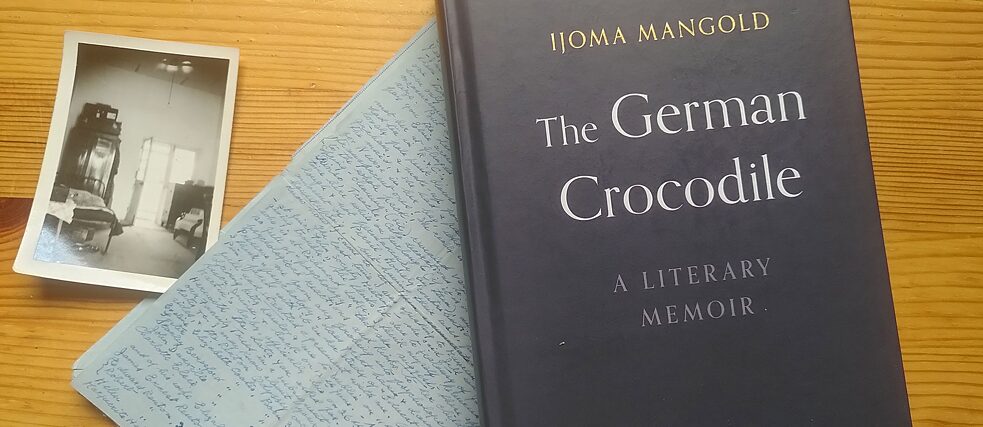November 2021
Ijoma Mangold: The German Crocodile

Mangold’s memoir – located between Germany and Nigeria – shares an emotional depth and a sense of humour with Jackie Kay’s Red Dust Road.
I didn’t know what to expect of Ijoma Mangold’s memoir The German Crocodile (tr. Ruth Ahmedzai Kemp). Mangold is one of the biggest literary critics in Germany, with a similar standing to Charlotte Higgins here in the UK. When I was a student in Germany, his articles were the first thing I’d seek out in my weekly copy of Die Zeit – I liked his approach, his apparent integrity, the fact that he didn’t seem to take himself too seriously. But still, I asked myself, how well was an autobiography from someone virtually unknown in English likely to do in the UK?
But then I started reading – and I remembered how years ago, when Jackie Kay’s autobiography Red Dust Road came out, it was read as Book of the Week on Radio 4. My mum had driven somewhere, and I remember her talking about sitting in the car park, unable to get out of the car because she couldn’t stop listening. In the book, Kay traces her coming of age as a young black woman in Scotland, as well as her journey to becoming a writer and her process of connecting with her biological parents: a Scottish mother and a Nigerian father. It’s an arresting memoir, full of Kay’s trademark wit and unmistakeable love.
While Mangold’s tone is quite different to Kay’s, there’s a similar emotional depth and sense of humour in The German Crocodile. Born to a Nigerian father and a white, German mother, the young Ijoma is brought up in Heidelberg by his mother – an empathetic psychotherapist who’s always urging the boy to communicate. (Yes, I am picturing her as Jean Milburn.) His father doesn’t enter his life until Mangold is in his twenties – at which point the young man is faced with a new family, a new culture and the possibility of an entirely different future.
The German Crocodile interweaves a whole range of threads into a fascinating tapestry. There’s the story of Mangold’s mother’s family, forced to flee Silesia after the second world war. There’s Mangold’s ode to his mother, whose unconventionality he is suspicious of as a child, only realising as a teenager that “she’s something of a celebrity among his school friends”. (The first chapter is narrated like a short story, in the third person present tense.) A major focus is Mangold’s uneasy relationship with his skin colour – his refusal as a young man to acknowledge that he faces racism, and his fascination with Silesia and Prussia in preference to Nigeria. (“Had I over-assimilated somehow, and become more German than any other German?”) He felt like an outsider as a teenager, he admits, but not because of his skin colour – rather because of his love of Thomas Mann.
This is the other major strand in The German Crocodile – and who doesn’t love a portrait of the artist as a young bookworm? Mangold’s vivid depictions of the wine-filled soirees of the questionable, mentor-like Tenno and the intrigues of the school drama club had me hooked. The decision of young Ijoma and the flamboyant Florian to secede from the school’s drama club, taking the best actresses with them, is particularly glorious. (Hats off to Ahmedzai Kemp – these sections are full of cultural and linguistic references, and she elegantly keeps the flavour of the German while offering just enough context for an anglophone reader.)
Does Mangold overdo certain points? Maybe. But he’s also figuring things out as he goes along, and that’s somehow refreshing. “I have absolutely no memory of this,” he admits at one point, “but clearly I’ve already squandered my reputation as a credible witness.”
About the author
Annie Rutherford is an incorrigible bookworm and Jill of all (word-based) trades. She is the Assistant Festival Director at StAnza (Scotland’s international poetry festival), a German-English literary translator, and runs Lighthouse Bookshop’s Women in Translation book group, among other things. She has been known to read while cycling (she does not recommend it), and can spot a misplaced apostrophe at a distance of fifty yards.Meet the author
For our 12th international online book club meeting on 23 November, we have invited Ijoma Mangold to read his book Das deutsche Krokodil with us.Reserve the original German title in the Glasgow library.
Borrow the original German title online in our E-Library.
Find out more about the blog.